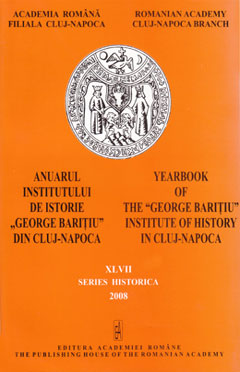Exegeza trecutului ca militantism politic. Cazul gândirii lui Ioan Budai-Deleanu
Exegeses of the Past as Militantism: The Case of Ioan Budai-Deleanu's Political Thinking
Author(s): Victor NeumannSubject(s): History
Published by: Editura Academiei Române
Keywords: Ioan Budai-Deleanu; Cultural History; Iluminism; Transylvania; Political Thinking
Summary/Abstract: The paper tries to respond to the following questions: what was the real message of the Transylvanian School, particularly of Budai-Deleanu's - one of its prominent representatives of this school?; what kind of motivations did the Romanian scholars of Transylvania invoke to assert the idea of nation taking into account the fact that the program to fight the illiteracy within the population had just begun?; was the thesis according to which religion, culture and politics had shaken hands in the 18th century in order to generate a nation of the Romanian elites sustainable?; what were the consequences of the fact that the cultivated Romanian class took the advantages of emancipation and modernization?; what role did the Prussian Protestantism of German language play in forming Budai-Deleanu's and his generation's thought?; how justifiable was the use of geography and history as instruments of political championship?; how the melting of ideas of the intellectual thought was possible in Transylvania since there was an incompatibility between the orientation of the Enlightenment and that of Romanticism? Budai-Deleanu was inspired by the German Protestant culture, which was behind the French and British political thought. The orientation towards formulation of the rights of freedom and equal political representation of the Romanians with the other groups was consonant with the idea of collective liberty and was justified in the context in which the Transylvanian School activated. The first intellectual modernization in the Transylvanian space by acquiring western ideas was a reality, however it has been produced in a moment when the Enlightenment ideas were either rejected or entered in a cone of shade. The plenary affirmation of the Romantic mysticism, contrary to the Enlightenment messages took place. Since the transition from one current to another in the spaces of German language happened rapidly and Transylvania was under a German cultural influence, the Enlightenment principles would be rapidly forgotten. In the 19th century, only the learned urban class would benefit of modernization. It used to be the dominant direction in Central and Southeastern Europe. Hence the genesis of a different political thought in comparison with the West, of a different way of understanding collective identity. It had little to do with the individual liberal spirit, a fact highlighted by ignoring the philosophers belonging to Locke's or Montesquieu's family. Ideas such as civil liberties and human rights had not become dominant in the Romanian milieu.
Journal: Anuarul Institutului de Istorie »George Bariţiu« - Series HISTORICA
- Issue Year: XLVII/2008
- Issue No: 47
- Page Range: 345-361
- Page Count: 17
- Language: Romanian

